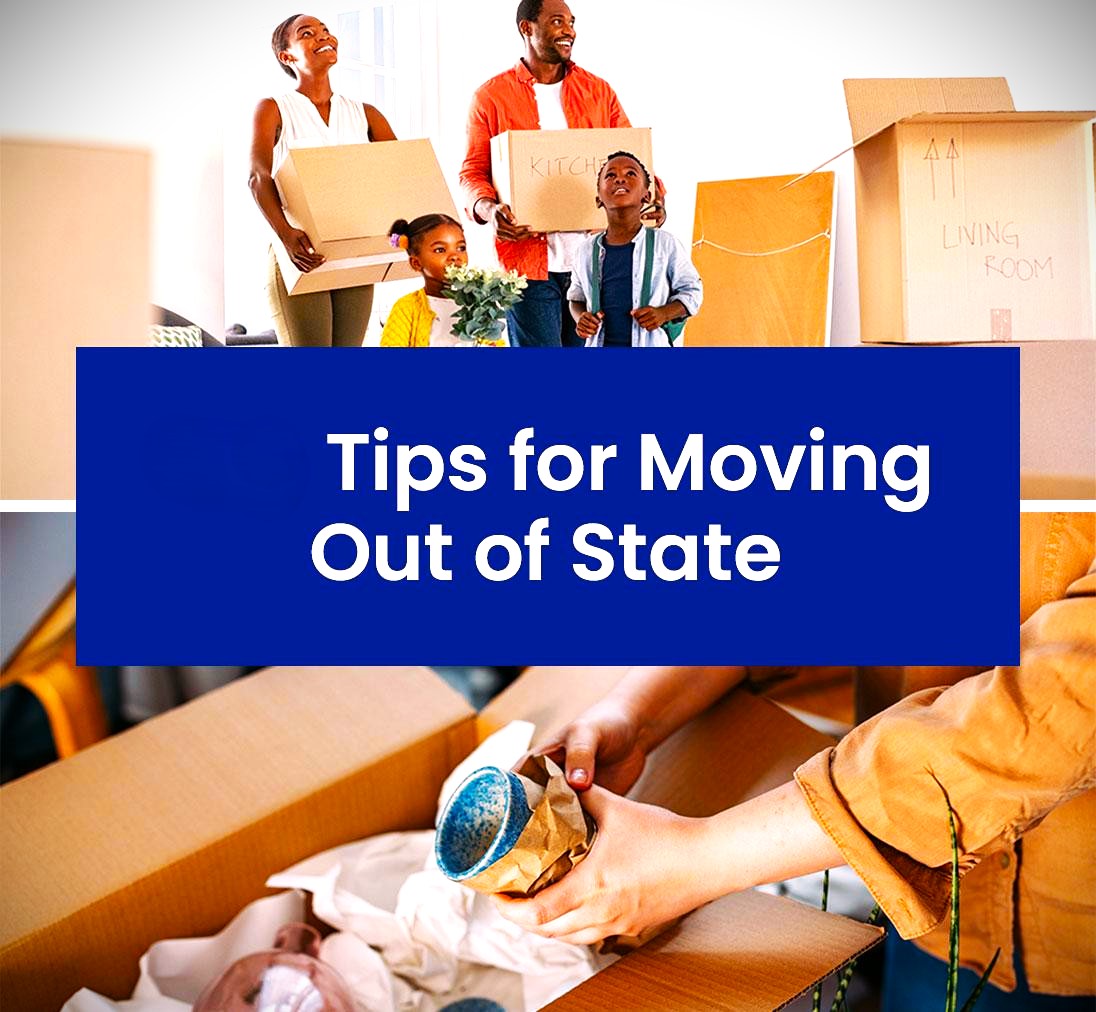Moving out of state can be challenging whether it’s a short move or across the country. Generally, the farther you go, the more details you need to manage. Before moving, make sure you’re fully prepared—from setting a budget to turning off utilities.
Here’s a simple checklist and some useful tips to help make your out-of-state move smoother.
Key Takeaways
- Moving out of state can range from $800 to $2,150 for a one-bedroom home.
- Think about job options, housing costs, overall living expenses, lifestyle, climate and available amenities in the new area.
- Decide if you’ll hire movers, set a budget, organize important documents and start packing early.
Create a Moving Budget
Moving can be expensive but there are ways to save if you plan carefully. Start by deciding how much you’re willing to spend. This will help you make smart choices, like picking affordable movers and buying necessary supplies without overspending.
A moving cost calculator can give you a good idea of the average expenses. For an out-of-state move, a one-bedroom home could cost anywhere from $800 to $2,150, especially for longer distances.
Don’t forget other expenses, setting up new utilities, WiFi, cable, fuel or airfare car shipping (if needed), hotels and meals if it’s a long trip. Planning ahead can help you manage these costs better.
Pick a Suitable Moving Company
Everyone has different moving needs. Some prefer to handle everything themselves, while others want full-service movers who will even do the packing. Think about what matters most to you and choose a moving company that matches your needs. For long-distance moves, start by looking up top-rated long-distance moving companies to find one that fits.
If you’re planning to move on your own, check out tips on moving and shipping items yourself or make sure any large items like furniture, piano are properly prepared.
Visit Your New Destination
Ideally, you’d visit your future home before moving to explore the area—find the nearest grocery store, dog park and popular local spots like restaurants. However, out-of-state trips can be costly and time-consuming, so this isn’t always possible. If it’s within your budget, a visit is definitely helpful.
If a visit isn’t possible use online tools to learn more about the area. Many cities have social media pages or websites with useful information. You can also search online for things to do, read reviews on Yelp, explore local real estate or even take a virtual tour on Google Maps. Getting familiar with the area online can make you feel more at ease about moving.
Figure Out Your Job Situation
If you’re moving for a new job, that’s great! If not, you’ll need to consider a few things.
If you plan to stay with your current employer, check their policy on working from a different office (if they have one at your new location), working remotely and if they offer any relocation assistance. If you’re moving without a job lined up, start exploring job opportunities early—ideally, before you even move.
Create a timeline for your job search to stay focused and check your progress regularly so you don’t lose track in the excitement of settling into your new area.
Get Your Paperwork in Order
Handling paperwork may not be the most exciting part of moving but it’s essential. You’ll need to update your billing addresses, cancel or transfer memberships and visit the DMV, among other things. Some tasks can be done before you move while others need to be completed once you’ve settled in your new state.
Here’s a checklist
- Credit cards
- Insurance
- Utilities
- Voter registration
- Driver’s license
- WiFi
- Cable
- Pet registration
- Gym membership
- Mail forwarding
Find a Place to Live or Stay
Finding a new home out of state can be challenging especially if you can’t see it in person. Luckily, many real estate agents now offer virtual tours making it easier to explore options remotely.
If you’re not ready to commit to a long-term rental or purchase without an in-person visit consider staying somewhere short-term (like an Airbnb, VRBO or hotel) until you find a place you’re comfortable with. Set a timeline for when you plan to move in permanently to keep things on track.
Go Through Your Belongings
It’s a good idea to avoid moving items you don’t need especially for an out-of-state move. Go through your things—closet, books, garage—and remove anything unnecessary. If an item no longer has value for you, donate it if it’s in good condition.
Pack Efficiently
Packing takes time and effort so start early. Avoid last-minute packing by planning ahead. Gather enough boxes in the right sizes, packing tape, padding for fragile items and keep essential items separate for easy access during your trip and upon arrival. This way, you won’t be digging through boxes just to find your toothbrush.
Need Storage Solutions for Your Move?
Chicago Movers Near Me offers licensed moving services and convenient storage options for households & businesses moving across the country or between states.
Make Plans to Socialize
Moving to a place where you don’t know anyone can be challenging. To feel more comfortable, plan ahead on how you’ll meet new people. Any location can be an opportunity to make friends if you’re willing to start a conversation. Asking questions about your new town is a great way to break the ice.
Important Things to Consider When Moving Out of State
Moving to a new state can be exciting but it’s important to think about a few key factors to make your transition smoother. Consider aspects like job and housing markets, cost of living, lifestyle, climate and local amenities.
Job & Housing Markets
Before moving, check the job market in your new location. Look into job availability in your field, prospects for career growth and local opportunities.
At the same time, explore the local real estate market to understand housing options whether you’re interested in apartments or houses. Think about affordability, location and how close it is to your work to make an informed choice and ensure a smooth transition.
Cost of Living
When moving to a new state, it’s important to think about how the cost of living will impact your budget. Start by researching housing expenses, like rent or mortgage payments, property taxes and homeowner’s insurance to ensure these costs fit within your budget. Also, try to estimate monthly utility bills including electricity, water and heating or cooling.
Consider other living costs as well such as transportation expenses for commuting or public transit options, as these can add up. Check the prices of groceries, healthcare and other daily essentials to get a realistic view of your future budget.
Culture & Lifestyle
When planning a move, it’s helpful to understand the culture and lifestyle of the new area. Look into social and recreational activities, the local arts and entertainment scene or other ways to enjoy your new surroundings. It’s also a good idea to consider the diversity and inclusiveness of the community, as this can greatly influence your overall experience.
Climate
Climate is another important factor. Different regions have different weather patterns so check if the climate in your new location suits your preferences. Think about temperature, humidity and how seasons change there. It’s also wise to look into any risks of natural disasters like hurricanes, tornadoes, earthquakes or wildfires in the area. Researching the local climate will give you a better idea of what to expect.
Local Amenities
When moving to a new state, researching local amenities can help make your transition easier. Start by finding out about essential services like hospitals, police stations and fire stations. Easy access to these services is important for your safety and well-being.
Next, look into dining and shopping options to meet your daily needs. Check for nearby grocery stores, restaurants and shopping centers, as these will add to your convenience and comfort as you settle in.
Also, explore local recreational spots based on your interests. This could include parks, gyms, hiking trails or lakes, providing spaces for physical activity and relaxation which can boost your overall quality of life.
Is It Worth Moving Out of State?
There are plenty of reasons to consider moving to a different state, like a lower cost of living, better housing options, being closer to family or friends and starting fresh. You might also want a different lifestyle, improved climate or more job or education opportunities. Whether or not it’s worth it depends on your personal situation.
A good first step is to research the state you’re interested in and, if possible, visit it to get a sense of the area. Deciding if the move is right for you is a personal choice, but taking these steps can help you make an informed decision.



